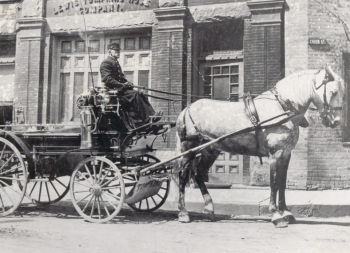
Shorting Blacksmiths
One suspects when a blacksmith first spotted the horseless carriage driving past his workshop, had he considered it more than a fad, he might have realized his business would be disrupted. But would he have referred to the car or it’s manufacturer as a disrupter? Probably not. Disruption is the new buzzword to describe change or transition.
It is difficult to pick winners from change and transition. Even when new technology changes the world, it can be difficult to pick a long-term winner. Consider for example when television first appeared in the 1950’s; More than 90 US manufacturers including Admiral, General Electric, Magnavox, Philco, RCA, Silvertone and Westinghouse dominated the market. In 1953 there was even a Radio-Electronics-Television Manufacturers Association, and they reported almost 7.3 million TVs were made in the U.S. By 1995 the last remaining U.S. television company, Zenith, was sold to Korea’s LG.
From supermarkets to postal services, and from transport to entertainment, established businesses and entrenched incumbents are fighting a new wave of online, international and cheaper solutions to the customers’ problems. And by the way, managing your own share portfolio just became a lot more challenging. Say good bye to set-and-forget.
But there is an interesting corollary to this disruption. While it’s challenging to pick the winners, it can be easy to pick the losers.
One industry that is becoming a rather obvious loser to disruption is the bricks-and-mortar retailing of books. Once a dominant presence in malls and shopping strips, the bookshop has been relegated to smaller footprints and specializations (industry specific or kids, for example) if it hasn’t become a curiosity.
Barnes and Noble is a brick and mortar plus e-commerce book store with bookstores across 50 US states. It is also a book retailer in structural decline. Revenues are declining by ten percent year-on-year, and given competition with Amazon, Apple and WalMart among others, this structural decline is likely to be unrelenting.
Many of the Barnes & Noble stores sell products which themselves are being disrupted. Music, Movies & TV departments within stores offer CDs, Vinyl LPs, DVDs and Blu-ray discs. That’s right Vinyl LPs! Ranging in size from 300 to 8,000 square feet these departments may stock over 12,000 titles.
Happily, Barnes and Noble do have their own digital e-Reader called NOOK, but thanks to to IPAD and Kindle, NOOK revenue declined by almost 40 per cent from the 4th quarter 2014 to the fourth quarter 2015.
There was one bright spot for the company – a business called B&N Education, with 724 stores located at university campuses. Sadly this company was spun out. It trades under a newer stock ticker. It also has the Barnes & Noble CEO after he jumped ship.
It’s all well and good identifying an opportunity to profit from the structural decline of a business. It is also helpful however to have unrealistic and optimistic expectations built into analyst revenue and earnings assumptions.
Given negative same store sales growth at Barnes & Noble and the rate of store closures, we believe consensus revenue growth estimates are too high and will need to be revised lower. And despite declining revenue growth, consensus analysts still have Earnings Before Interest and Tax margins increasing.
Finally after identifying a business possibly in structural decline and with irrationally exuberant expectations, it is also helpful to have an expensive price.
For the last twelve months Net Profit amounted to just $20 million but the market capitalization of this business, with challenging prospects at best, is US$1.1 billion. That’s a price to earnings multiple of 59 times.
The Montaka Global Fund went short Barnes & Noble and shortly after the shares fell almost 30 per cent. When thinking about Barnes and Noble it’s worth remembering the Blacksmith.
The Montaka Global Fund and the forthcoming Montaka Global Access Fund can provide the benefits of 1) the ability to profit from extraordinary global businesses, 2) the ability to profit from deteriorating businesses, 3) enhanced downside-protection from significantly reduced net exposure to the stock market overall and 4) currency diversification.
To pre-register your interest in learning more about the Montaka Global Access Fund (minimum initial investment $50,000) click here to leave your details.
Personally, a particularly enjoyable article for me Roger. My family were Blacksmiths and Coach builder’s in Sydney in the 18th century. Whilst being very successful as Coach builder’s in particular, they failed to change with the times and went out of business in the early 19th century. I often lament that it should have been an FJ Melville not a FJ Holden, but, it just does not sound the same.
I’d buy a Melville any time David.
Hi Roger,
I wonder if the decline of bookshops is universal. The ones in France seem to be teeming with customers. And I have a friend who runs a tiny bookshop here selling “hand-picked” books, giving exceptional service and advice, where there is a constant stream of buyers.
On a minor point, one of the magazines I read has a pedant of the month award, so at the risk of achieving that status here, I notice that the gremlin apostrophe (it’s) has infiltrated your normally impeccable writing style.
That aside, thanks for your usual clarity of thought.
Good morning Roger,
I was wondering if the Montaka fund has targets for gross and net equity exposure?
Regards,
Pat
Yes absolutely. Give David Buckland a call on (02) 8046 5000 or email David on office@montinvest.com for more information.
While the helpful “expensive price” is the result of excessive optimism on the part of a majority of investors, it only takes one of these investors to decide that for whatever reason the stock is ‘cheap’ and come in with a bid at a sometimes substantial premium.
When shorting a stock, what consideration do you give to the possibility of a takeover bid?
Good article Roger, always nice to see some info about a stock you (dis)like :)